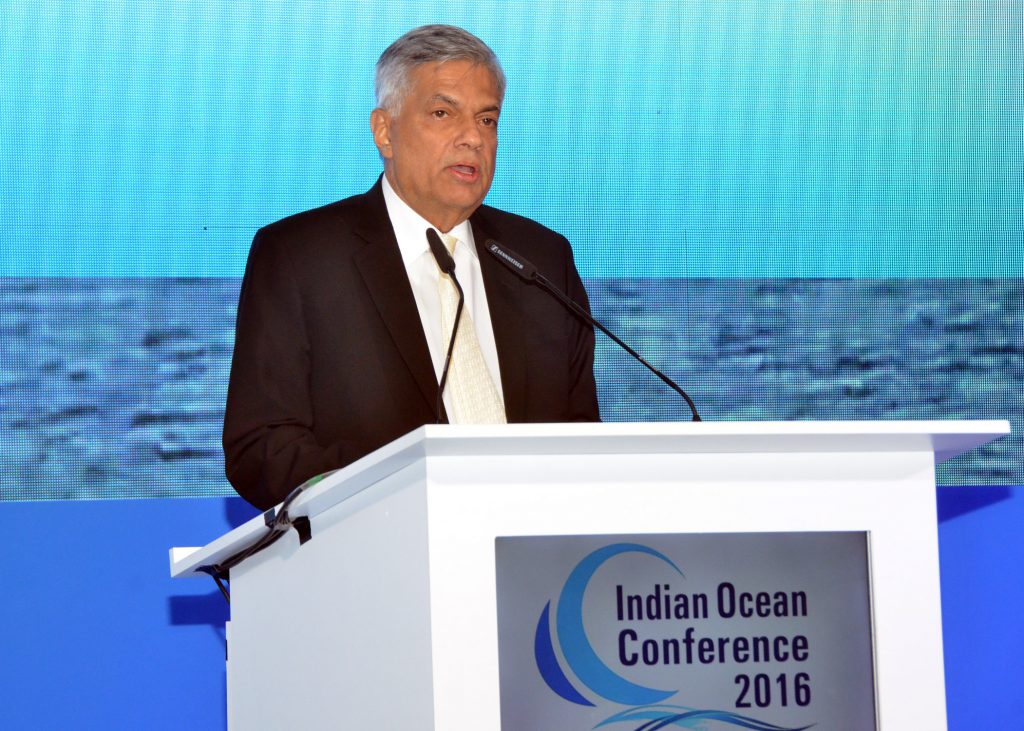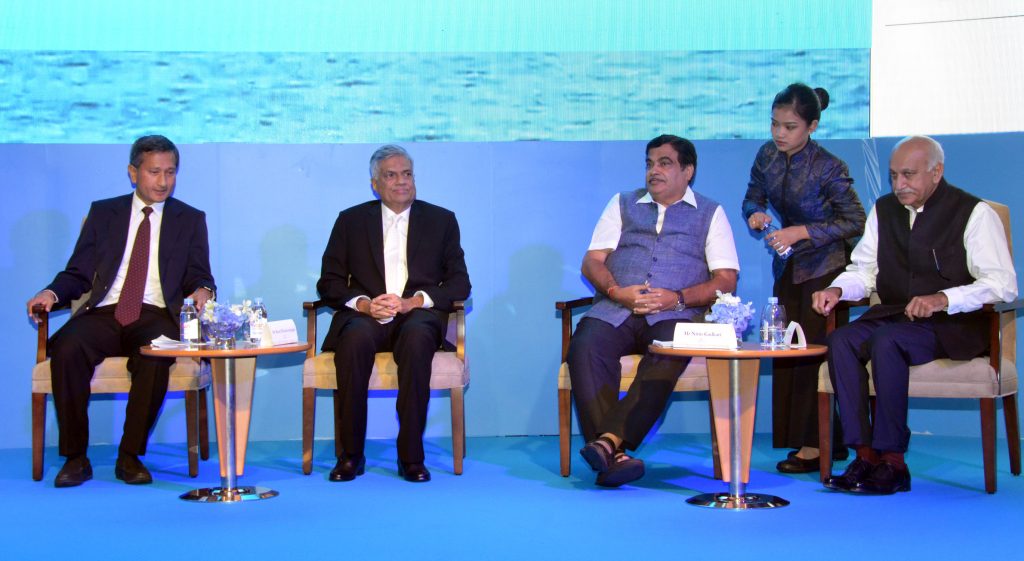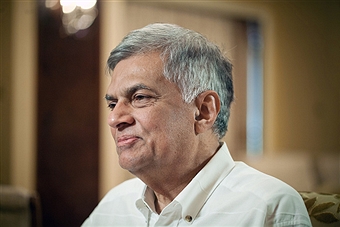Singapore, September 2 (NIA): The Sri Lankan Prime Minister,Ranil Wickremesinghe, has questioned the viability of the US bid to fashion a combined Indo-Pacific security strategy, given the diversity and uniqueness of the Indo-Pacific region.
“The disparate nature of Asia not only in terms of size, resources, diversity and interests of both regional and extra regional states, but also growing militarization, historical disputes and strategic mistrust, pose serious challenges to the emergence of a viable and sustainable strategic security order.” Wickremesinghe said in his inaugural oration at a conference on “Global Power Transition and the Indian Ocean” at Singapore on Thursday.
“There will be resistance to any single country attempting to unilaterally shape the strategic order of the region. Yet building political will and strategic trust and the institution of institutional structures are all prerequisites for such an inclusive multilateral strategic security order that can respond in case of any emergency. But in reality, these two oceans of Asia also make for two distinct spheres of influence within the Asian continent, each maintaining separate sophisticated trading and political systems while interacting with each other,” he pointed out.
Quoting US thinker Francis Fukuyama to buttress his argument, the Sri Lankan Prime Minister said: “Asia is polycentric, multipolar, and constantly evolving. There is no uniformity in Asia in terms of geopolitics and culture and each of those countries is a separate world to itself, even as it overlaps in trade and commerce with its neighbors and with the United States. It is a challenge for Americans to keep up with that region.”
Historical Influences
For the US, the Pacific Region, not the Indian Ocean, has been intrinsic to US security. For this reason US Administrations from Presidents Franklin D Roosevelt to George W Bush have treated these two areas separately. But on the other hand, the countries in the Indian Ocean Region have historically been reluctant to join power blocs, Wickremesinghe said.
The countries of the Indian Ocean region have historically played a significant role in global trade and commerce, given rise to some of the great civilizations and religions of the world, and are home to unique and diverse cultures and histories. Whilst partnership and collaborative relationships were built with countries and civilizations outside the region, the region maintained its multi-polar characteristic.
“Therefore to my mind, the notion of Indo-Pacific or the Indo Asia-Pacific appears destined to remain a more conceptual rather than a realistic premise. The collapse of the Trans Pacific Partnership has further weakened the arguments for it,” the Sri Lankan PM said.

Indian Ocean Growing Faster Than Other Regions
The Sri Lankan PM pointed out that, today, the Indian Ocean region is acquiring an intrinsic significance of its own.
“The Atlantic basin is declining. Central Asia and Africa have yet to evolve into mature political economies. The Middle East is in turmoil and Latin America is also undergoing a somewhat troubled growth. The Pacific basin – particularly the Eastern Pacific is very dynamic but it has its own latent instabilities such as the South China Sea and East China Sea disputes, developments in North Korea, increasing militarization of disputes and the absence as yet of regional institutions to bring coherence to the political economy of the area. So it is possible to argue that the Indian Ocean Region has an extraordinary opportunity to create something new in the global context and something historically uniquely beneficial to its people.”
“Already, the ASEAN nations are on the ascent in the eastern side of the Indian Ocean. Three ASEAN members control the sea-lanes linking the Indian Ocean to the Pacific. Moreover, South Asia is also kindling underpinned by the growth of India, making it one of the fastest growing regions of the world. Since South Asia dominates the Indian Ocean and therefore this power transition in the Indian Ocean will be heavily influenced by South Asian developments.”
“Consequently, I see the South Asia and ASEAN countries presenting an emerging opportunity that can bring with it benefits similar to those that came in the past to the Atlantic and Pacific basins.”
“Our responses will shape our destiny in the 21st Century. The cooperation and coordination between ASEAN and SAARC including the Ramayana Connection have given us strong cultural affinities. We have similar Governmental institutions and commercial practices. The English language is a link language. We have a huge cohort of youth more regionally conscious than their parents. We also have a lot of work to do in bringing these two groups together. More frank in-depth discussions; Ongoing dialogue at the highest levels. We must not allow the internal disputes and differences of these multilateral organisations to impede the collective relationships between the two groups. It also challenges SAARC to reach a higher level of cooperation than what we have been able achieve so far.”
“The opportunities are there – waiting to be exploited – and with ingenuity we should be able to forge ahead,” Wickremesinghe said.
Indian Ocean Countries Should Shape Their Future Independently
Calling upon the countries of the Indian Ocean countries to shape their destiny themselves, Wickremesinghe said: “It is time for Indian Ocean countries especially Asian nations to take the lead in determining their own future. It is our belief that an Indian Ocean Order needs to be crafted with accepted rules and agreements that would guide interactions between states.”
“This Order needs to be built on a consensual agreement and no singular State should dominate the system. The Indian Ocean Order would have the primary responsibility of upholding the freedom of navigation in the Indian Ocean, ensuring that shipping and air routes to East Asia and beyond are kept open, building closer economic cooperation amongst countries in the region, incorporating an Indian Ocean Development Fund for development of the region, and in particular, establishing a strong Humanitarian Assistance and Disaster Management mechanism to deal with natural and manmade disasters.”
Existing Organizations Ineffective
Today, IORA (the Indian Ocean Rim Association) the regional organization is not an effective force and has fallen short of expected levels of delivery with regard to regional cooperation. It is dormant when the strategic concepts concerning the Indian Ocean are being discussed, the Prime Minister said.
“What is required as a start is a dialogue between SAARC and ASEAN leaders. Indonesia, an ASEAN member also the current Chair of the IORA, can initiate this dialogue – spanning the IORA and all the interested major and middle powers.”

Suggests Formation of Indian Ocean Assembly
Suggesting the establishment of an “Indian Ocean Assembly”, Wickremesinghe said that the Assembly should bring together inter alia Heads of State and Governments, leaders of political parties, officials, academics, intellectuals, non-governmental sectors, cultural and commercial leaders, media representatives, youth groups in order to recommend measures for consideration by the Indian Ocean region.
There should be a program for cooperation in Education and Human Capital Development.
“This single measure will make a significant contribution to the rapid development of the region,” he said.
‘Our task, then, is to begin building a political eco-system that is both prescriptive and preventive; prescriptive in that it creates a structure out of the natural affinities of geography, culture and resources that already exist; preventive in that it contains the inevitable local disputes and prevents them from disrupting or spilling over on to a common Indian Ocean agenda, Wickremesinghe said.




























































